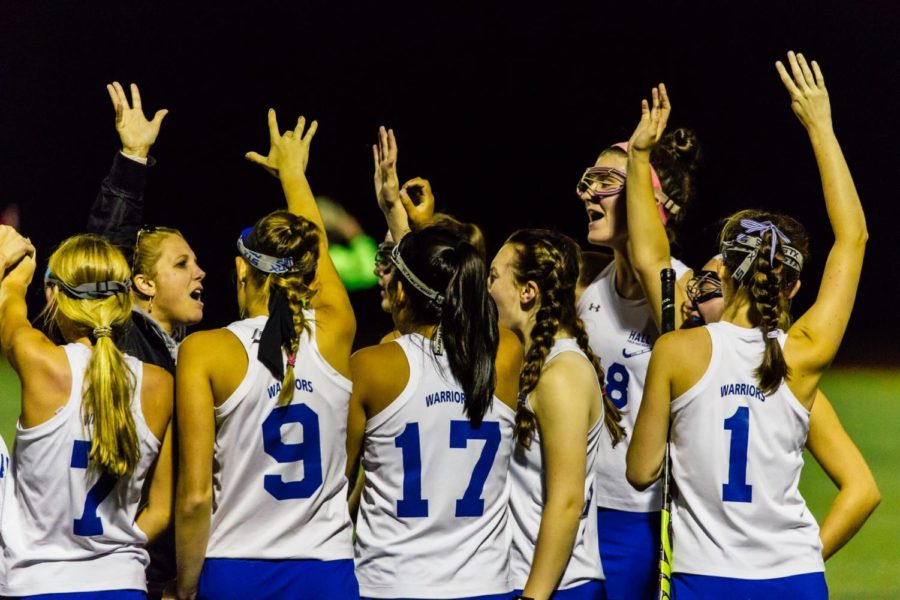Have Seniors Earned Their Varsity Right?
2017 Varsity Field Hockey huddle at the end of a game.
At Hall High School, there is a common understanding in most sports programs that if a senior has played for all three years prior, they automatically have a spot on the varsity roster for their senior season. This unwritten “rule” is constantly debated between players and coaches over whether or not it should be followed. The CIAC handbook does not state that it is required for a senior to play varsity, making it up to the schools and sports programs to make the final decision. Hall, as well as the majority of surrounding public schools, rarely places a senior on Junior Varsity.
There are mixed opinions regarding this precedent, but one seems to prevail. Many students in opposition to the “rule” are concerned with the success of Hall’s sports teams. They believe that only the best athletes should be on varsity regardless of grade level.
Varsity athlete Maggie Grant, a junior at Hall, argues that some seniors “take up roster spots for other kids, [. . .] especially when you make it to states and can only have a certain number of kids on the roster.” Without the best athletes, she, along with others, has been concerned about how the team can pull through a win.
Grant also addressed how seniors are less motivated than underclassmen to increase their skills, adding how they play the sport “not really caring about it.” During the 2016-2017 season, there were 13 seniors on the Varsity Field Hockey team with a record of 8-6-2 (wins-losses-ties). They made it to the first round of the CIAC Class L Tournament. It was a tough game, but they ended up losing 0-3 against Fairfield Warde.
Isabella Livingston, a dedicated senior athlete in cross country as well as indoor and outdoor track, has been a varsity letter athlete for all four years. For track, she argues, the point system is different than on team sports. “For sports like running or tennis where there’s only a certain number of varsity [spots], I don’t think that they should [automatically be placed] because you need the places to score or get points and it doesn’t make sense.”
Another varsity-level athlete, who chose to leave their name anonymous, agrees as well. They state that “varsity is for the greater good of the team, so I think it should be earned [. . .] If there’s a freshman that’s better than them, why wouldn’t they let the best players [on the team]?”
Coaches, however, show a different side of the story. Frank Robinson, the football coach and a P.E. teacher at Hall High School, goes into detail regarding the advantages of having the seniors all move up to the varsity teams. “The seniors who maybe don’t play as much can certainly help out in practice. Like we have football guys all the time [. . .] who are seniors and don’t play a lot. We’re able to get them on special teams.” The seniors who do not play as much can still help out in practice during drills and cheer from the sidelines during games. He addresses the idea of cutting seniors from the sport, adding, “I think if it’s a cut sport, you should cut [seniors]. I think if it’s not a cut sport, you shouldn’t.”
Lexi Gellerman, a senior varsity basketball and soccer player, supports this arrangement in team sports. “If you’re showing commitment and dedication to the program, then you should also deserve to be at the higher seat at the higher level. [. . .] No matter if you’re at the end of the bench or on the field, you still have an impact on the success of the team.”
This issue seems to be dependent on the sport and the past experience of the athlete. In many cases, students’ opinions are influenced in relation to the sport they play, whether it be in favor or against the guideline.






